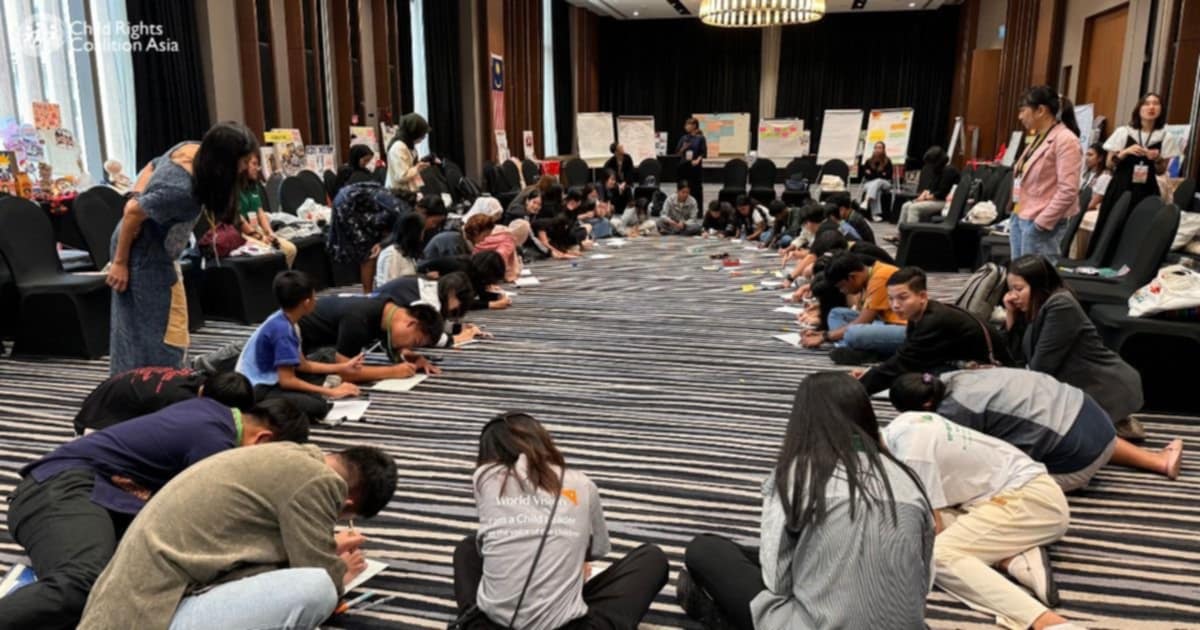The 2024 Regional Children’s Meeting (RCM), organized by Child Rights Coalition Asia (CRC Asia) with support from Plan International, Save the Children, Sverige Sweden, and Taiwan Foundation for Democracy, brought together 36 children from across Asia to discuss pressing issues affecting their rights in the digital environment. This year’s theme, #GENAI (Generative Artificial Intelligence), highlighted the opportunities and challenges that AI presents to children’s rights, intersecting with their civil and political rights.
The meeting, which was held in Bangkok, Thailand last August 14-16, 2024, provided a platform for children to share their experiences, learn from one another, and advocate for meaningful change in the digital world.
The meeting aimed to explore the evolving digital landscape and its implications for children. Discussions centered on the opportunities and risks of Generative AI, particularly its role in shaping children’s education, privacy, and advocacy work. Through interactive sessions, participants shared their experiences in navigating digital spaces, shedding light on both the empowering and exploitative aspects of technology. The program also sought to equip children with the skills and knowledge to safeguard their digital rights while amplifying their voices in decision-making processes.
 Beyond discussions, the event fostered cross-cultural exchange through market booths and a cultural night where participants showcased their national identities, advocacy efforts, and traditional practices. This interactive element reinforced solidarity among young advocates and emphasized the richness of diverse perspectives.
Beyond discussions, the event fostered cross-cultural exchange through market booths and a cultural night where participants showcased their national identities, advocacy efforts, and traditional practices. This interactive element reinforced solidarity among young advocates and emphasized the richness of diverse perspectives.
Key Sessions and Discussions:
Over three days, five thematic sessions guided the conversations:
Session 1: Our Civil and Political Rights
Children examined how their civil and political rights are influenced by digitalization. Through a workshop, they explored whether their voices are genuinely heard in legislative processes and school policies.
Session 2: Empowering Child Human Rights Defenders (CHRDs)
Facilitated by experts from Childline Thailand Foundation and Amnesty International, this session focused on the role of digital tools in advocacy. Participants reflected on both the advantages and challenges of online activism, such as cyberbullying, algorithmic bias, and institutional neglect.
Session 3: Children’s Rights in the Digital Environment
A crucial conversation emerged on children’s right to privacy and freedom of expression in online spaces. Activities and discussions among children highlighted the growing concerns sharenting—where parents post about their children online without consent—and the rise of kidfluencers, whose digital footprints are often monetized at a young age.
Session 4: AI, May I?
A deep dive into Generative AI (Gen AI) prompted discussions on its benefits and ethical risks. While children acknowledged AI’s potential in amplifying advocacies, assisting with schoolwork, and content creation, they also raised concerns about misinformation, deepfakes, and data privacy. Children emphasized that while AI and digital platforms offer incredible opportunities, they also exacerbate societal inequalities. They raised concerns about how AI and digitalization disproportionately affects children from low-income backgrounds and those with disabilities, limiting their access to resources and increasing their vulnerability to exploitation. Furthermore, they highlighted the mental health impacts of excessive digital engagement, from cyberbullying to the emotional disconnect created by social media.
Participants formulated recommendations for policymakers and tech companies to ensure AI remains a tool for empowerment rather than exploitation.
Children’s Call to Action:
Children at RCM 2024 voiced clear and urgent recommendations:
- Governments must strengthen regulations to protect children’s digital privacy and safety.
- Tech companies should implement child-friendly safety features, ensuring that AI does not reinforce harmful stereotypes or exacerbate digital inequalities.
- Children’s voices must be actively included in AI and digital policy discussions.
- The digital divide must be addressed to ensure equitable access to technology for all children, particularly those in marginalized communities.
- Schools and parents should integrate digital literacy education, equipping children with the skills to navigate online spaces responsibly.
Next Steps and Continued Advocacy
The recommendations from the children were not only shared with Meta but also presented at key international and regional forums to amplify their voices. In September 2024, CRC Asia brought these insights to the ASEAN ICT Forum on Online Child Protection in Bali, emphasizing the urgent need for stronger child safeguarding measures in digital spaces. Later, in December 2024, these recommendations were further discussed at the Virtual Side Event on Protecting Children under the UN Treaty on Business and Human Rights, highlighting the role of private companies in upholding children’s rights in digital environments. Finally, at the Internet Governance Forum in Riyadh and online, CRC Asia ensured that the perspectives of young advocates were recognized in global internet governance discussions.
CRC Asia is committed to amplifying children’s voices in global digital governance. Recognizing the growing risks of AI-powered disinformation—particularly in elections—CRC Asia is working with partners to push for stronger regulations on AI-generated content. There is also a concerted effort to establish child safeguarding policies within tech companies, ensuring that their platforms prioritize child safety and well-being.
As digital landscapes continue to evolve, CRC Asia and its partners remain dedicated to ensuring that children’s rights are at the heart of technological advancements. By empowering children as advocates, fostering meaningful dialogues with policymakers, and holding tech companies accountable, the movement toward a safer and more equitable digital world for children is well underway.





